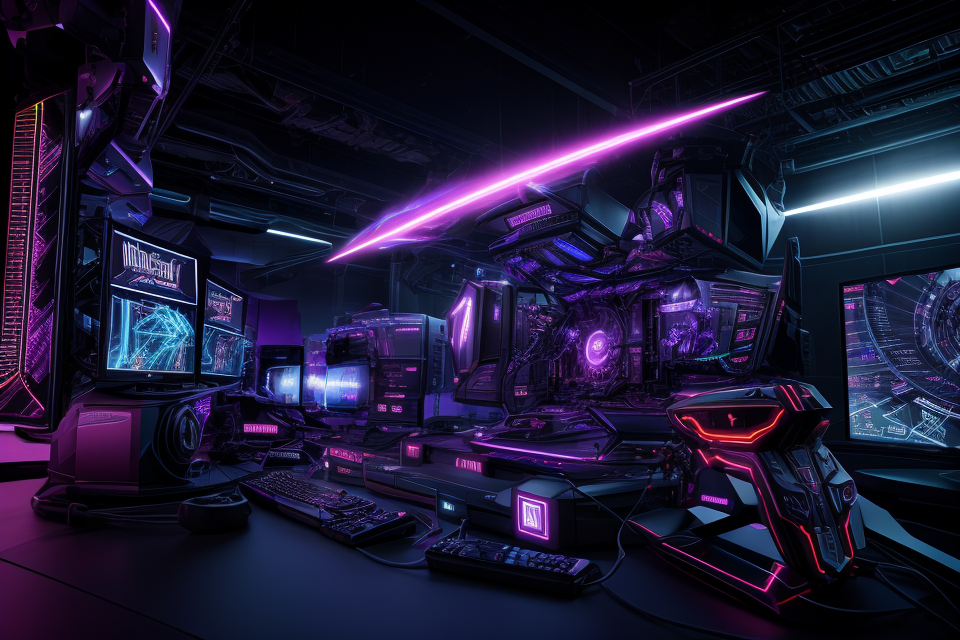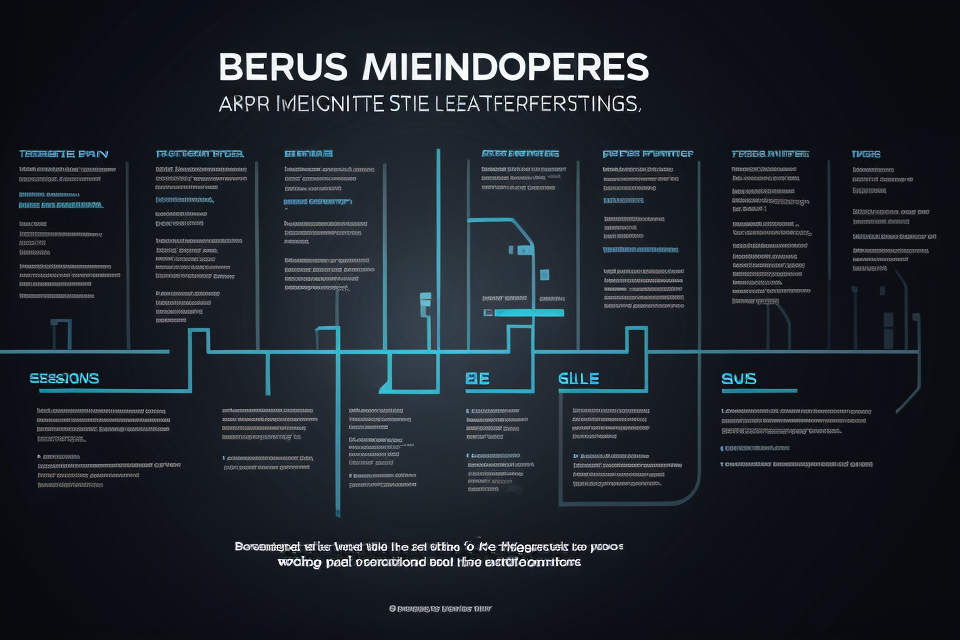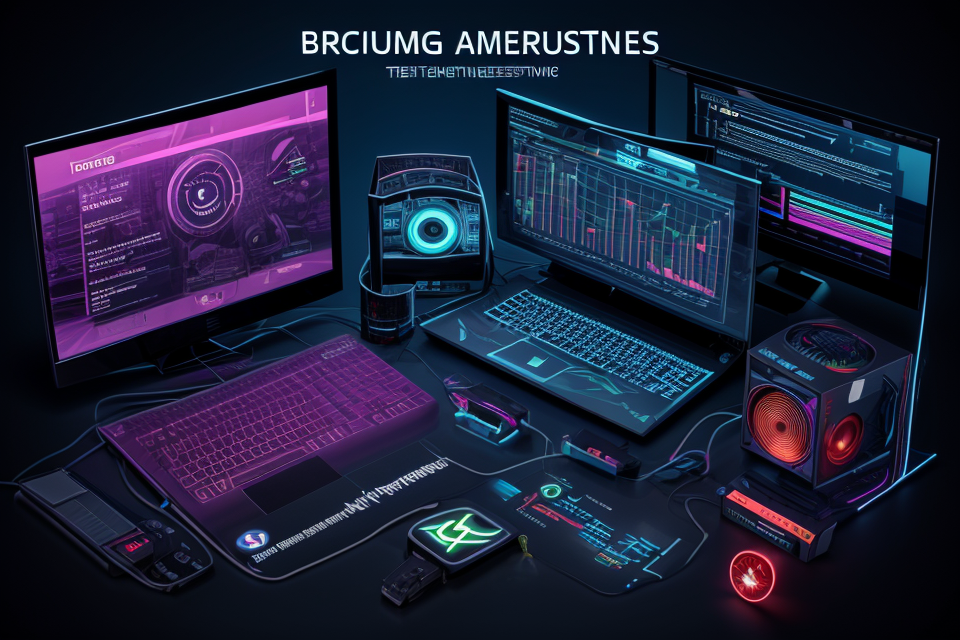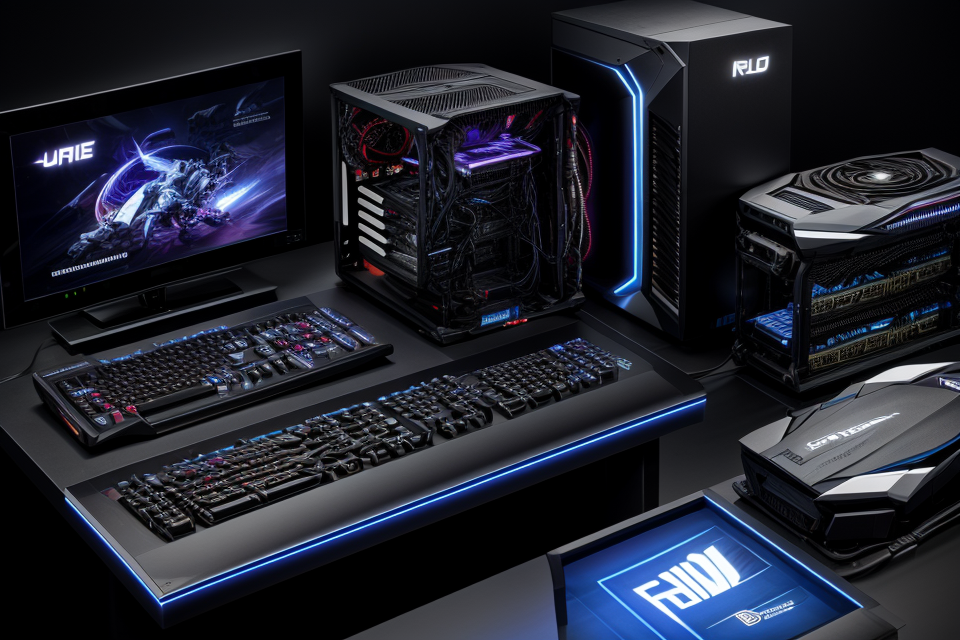
When it comes to gaming, performance is key. But the question remains, which is more important for gaming performance: the CPU or the GPU? Both of these components play a crucial role in determining the overall performance of your gaming experience. The CPU, or central processing unit, is responsible for executing instructions and managing the overall operation of the computer. The GPU, or graphics processing unit, is specifically designed for rendering images and handling the complex calculations required for gaming. So, which one is more important for gaming performance? Let’s dive in and find out.
The performance of a gaming computer depends on both the CPU and GPU, but the GPU has a more significant impact on gaming performance. This is because the GPU is responsible for rendering images and handling the complex mathematical calculations required for rendering graphics in real-time. A high-end GPU can handle more complex graphics and render them smoothly, while a lower-end GPU may struggle to keep up with demanding games. In contrast, while a high-end CPU can also improve gaming performance, it has a less direct impact on frame rates and smoothness than a high-end GPU. Therefore, when it comes to gaming performance, a powerful GPU is more important than a high-end CPU.
Factors Affecting Gaming Performance
CPU
The central processing unit (CPU) plays a crucial role in determining the overall gaming performance of a computer. Here are some key factors that affect the CPU’s performance:
- Processor speed and architecture: The processor speed, measured in GHz (gigahertz), indicates how many cycles per second the CPU can perform. The architecture of the CPU, such as the number of cores and the size of the cache, also affects its performance.
- Number of cores and threads: Modern CPUs can have multiple cores and threads, which allow them to perform multiple tasks simultaneously. This can greatly improve the performance of games that can take advantage of multiple cores and threads.
- Cache size and type: The CPU’s cache is a small amount of high-speed memory that stores frequently used data. The size and type of the cache can affect the CPU’s performance, as it can determine how quickly the CPU can access frequently used data.
- Single-core performance vs multi-core performance: Some games may be more dependent on single-core performance, while others may benefit more from multi-core performance. It is important to consider the specific needs of the game when determining the optimal CPU configuration.
GPU
- Graphics card model and brand
The graphics card model and brand play a crucial role in determining the gaming performance of a computer. A high-end graphics card from a reputable brand such as NVIDIA or AMD can significantly improve the visual quality and frame rates of games compared to a lower-end card.
- Number of CUDA cores and texture units
The number of CUDA cores and texture units on a graphics card also affects its performance. CUDA cores are responsible for processing graphics calculations, while texture units are responsible for loading and manipulating textures. A graphics card with more CUDA cores and texture units can handle more complex graphics and textures, resulting in better performance.
- Memory size and type
The memory size and type of a graphics card also play a significant role in gaming performance. A graphics card with more memory can handle more complex graphics and textures, resulting in better performance. The type of memory used in a graphics card can also affect its performance. High-end graphics cards typically use faster and more efficient memory, such as GDDR5 or GDDR6, which can improve performance compared to lower-end cards that use slower memory, such as DDR3.
- Clock speed and memory bandwidth
The clock speed and memory bandwidth of a graphics card also affect its performance. The clock speed of a graphics card determines how many calculations it can perform per second, while the memory bandwidth determines how quickly it can access and load data from memory. A graphics card with a higher clock speed and memory bandwidth can handle more complex graphics and textures, resulting in better performance.
CPU vs GPU: Pros and Cons
CPU Pros
- Better single-core performance: The CPU, or central processing unit, is responsible for executing most of the instructions in a computer. In gaming, this means that the CPU is responsible for handling many of the tasks that are necessary for the game to run smoothly. The CPU’s single-core performance is crucial in gaming because it determines how quickly the CPU can execute these tasks. A CPU with a higher single-core performance will be able to handle more tasks at once, which can lead to a smoother gaming experience.
- Less prone to overheating: Unlike the GPU, which can become very hot during heavy use, the CPU is less prone to overheating. This is because the CPU has built-in cooling mechanisms, such as heat sinks and fans, that help to dissipate heat. Additionally, the CPU is not as reliant on high clock speeds as the GPU, which means that it can run at a lower temperature without sacrificing performance.
- More cost-effective: In general, CPUs are more cost-effective than GPUs. This is because the CPU is a more complex piece of hardware that performs a wider range of tasks, while the GPU is designed specifically for graphics processing. As a result, CPUs tend to be cheaper than GPUs, making them a more cost-effective option for gamers who are looking to upgrade their systems. Additionally, because the CPU is less reliant on high clock speeds, it is possible to get decent gaming performance from a CPU that is not as powerful as a high-end GPU.
CPU Cons
- Less capable of handling complex tasks: The CPU (Central Processing Unit) is responsible for executing a wide range of tasks in a computer system, including managing input/output operations, controlling the system bus, and coordinating the activities of other system components. However, when it comes to gaming performance, the CPU’s capabilities may be overshadowed by the GPU (Graphics Processing Unit). This is because many modern games rely heavily on GPU-intensive tasks such as rendering graphics and animations, physics simulations, and AI processing. As a result, a high-performance GPU can significantly improve gaming performance, even if the CPU is not as powerful.
- Less upgradeable: While the CPU can be upgraded by replacing it with a higher-end model, this process can be difficult and expensive. Additionally, many CPU upgrades require additional cooling and power supply systems, which can further complicate the process. In contrast, the GPU can be easily upgraded by simply replacing it with a newer model that offers better performance. This makes upgrading the GPU a more attractive option for gamers who want to improve their system’s performance without having to invest in a complete system overhaul.
- Less powerful in multi-core tasks: While many modern CPUs feature multiple cores to improve performance, the GPU is specifically designed to handle complex graphics rendering and other tasks that require massive parallel processing. This means that the GPU can often outperform the CPU in tasks that require multi-core processing. Additionally, many modern games are designed to take advantage of multi-GPU configurations, which can further improve performance by distributing the workload across multiple GPUs. This means that a high-performance GPU can often provide a significant boost to gaming performance, even if the CPU is not as powerful.
GPU Pros
Better multi-core performance
In the context of gaming, a GPU’s multi-core performance plays a crucial role in determining its overall gaming performance. The ability of a GPU to handle multiple tasks simultaneously, often referred to as “parallel processing,” is an essential factor in gaming performance. A GPU with more cores can perform more tasks at once, resulting in smoother frame rates and better overall gaming performance. This is particularly important in games that utilize advanced graphics techniques such as real-time ray tracing or massive open-world environments.
Better suited for handling complex tasks
GPUs are specifically designed to handle complex tasks such as rendering images and animations. This makes them well-suited for handling the demands of modern gaming. While CPUs can also handle some of these tasks, they are typically better suited for tasks such as running code and performing calculations. This means that when it comes to gaming performance, a GPU with a high level of processing power is typically going to be more beneficial than a high-end CPU.
Easier to upgrade
Another advantage of a GPU is that it is typically easier to upgrade than a CPU. While both CPUs and GPUs can be upgraded, the process of upgrading a GPU is often simpler and less expensive. This is because GPUs are designed to be replaced as technology advances, and many newer models are backward compatible with older systems. In contrast, upgrading a CPU often requires purchasing a new motherboard and other components, which can be expensive and time-consuming.
GPU Cons
- Overheating
- Expensive
- Power supply requirements
GPUs are known to be more prone to overheating compared to CPUs. This is because GPUs have a larger number of transistors and generate more heat due to their intensive workload during gaming. Overheating can cause performance issues, such as slow frame rates and graphical artifacts, and can even lead to permanent damage to the GPU.
Another con of GPUs is that they are generally more expensive than CPUs. High-end GPUs can cost several hundred dollars, which can be a significant investment for gamers. Additionally, some GPUs may require additional power supply to function properly, which can add to the overall cost of building a gaming PC.
Furthermore, GPUs are known to consume more power than CPUs, which can lead to higher electricity bills. This is especially true for gaming PCs that have multiple GPUs, as they require more power to operate. Therefore, it is important to consider the power consumption of a GPU before making a purchase.
The Interplay between CPU and GPU
Syncing and balancing
When it comes to gaming performance, both the CPU and GPU play crucial roles. The way they work together is critical to the overall experience. One aspect of this interplay is syncing and balancing, which ensures that the CPU and GPU are working in harmony to deliver smooth, high-quality graphics.
Frame syncing and tearing
Frame syncing and tearing are related concepts that can impact the gaming experience. Frame syncing refers to the process of synchronizing the frame rate of the game with the refresh rate of the monitor. This is important because if the frame rate is too high, it can cause tearing, which is a visual artifact that appears as a diagonal line running across the screen. To avoid tearing, V-sync can be used to limit the frame rate to the refresh rate of the monitor. However, this can also introduce input lag, which can negatively impact the gaming experience.
V-sync and frame rate limits
V-sync is a technology that synchronizes the frame rate of the game with the refresh rate of the monitor. It does this by ensuring that the game only renders frames at a rate that matches the monitor’s refresh rate. This helps to avoid tearing and ensure that the game runs smoothly. However, V-sync can also introduce input lag, which can negatively impact the gaming experience.
To avoid this, some gamers choose to disable V-sync and rely on the GPU to control the frame rate. This can result in a smoother experience, but it can also lead to tearing if the frame rate is too high.
Frame time and latency
Another important aspect of syncing and balancing is frame time and latency. Frame time refers to the amount of time it takes for a frame to be rendered and displayed on the screen. Latency, on the other hand, refers to the delay between a user’s input and the corresponding action in the game.
In order to achieve the best gaming performance, it’s important to minimize both frame time and latency. This can be achieved by ensuring that the CPU and GPU are working together efficiently. For example, overclocking the GPU can help to reduce frame time and improve performance. Additionally, using a high-speed SSD can help to reduce latency by providing faster access to game files and data.
Overall, syncing and balancing are critical aspects of gaming performance. By ensuring that the CPU and GPU are working together harmoniously, gamers can enjoy smoother, more responsive gameplay.
Optimizing game performance
Optimizing game performance is crucial for any gamer looking to get the most out of their gaming experience. There are several ways to optimize game performance, and each method has its own set of benefits and drawbacks. In this section, we will discuss some of the most effective methods for optimizing game performance.
Adjusting graphics settings
One of the most straightforward ways to optimize game performance is by adjusting the graphics settings. Most games have a range of graphics settings that can be adjusted, including resolution, graphics quality, and texture settings. By reducing the graphics quality or lowering the resolution, you can significantly reduce the strain on your GPU, which can result in smoother gameplay and higher frame rates. However, reducing the graphics quality too much can also result in a less immersive gaming experience, so it’s important to find the right balance.
Overclocking and undervolting
Overclocking and undervolting are two techniques that can be used to optimize game performance by adjusting the clock speed and voltage of your CPU and GPU. Overclocking involves increasing the clock speed of your CPU or GPU beyond its default settings, which can result in higher performance and frame rates. However, overclocking can also increase the risk of instability and damage to your hardware, so it’s important to be careful when overclocking. Undervolting, on the other hand, involves reducing the voltage of your CPU or GPU, which can result in lower power consumption and cooler temperatures. Undervolting can also increase the stability and lifespan of your hardware, but it requires careful calibration to avoid instability or damage.
Updating drivers and firmware
Finally, updating your graphics drivers and firmware can also help optimize game performance. Graphics drivers are responsible for translating the commands from your game into instructions that your GPU can understand, and updating them can often result in improved performance and stability. Similarly, updating your GPU firmware can improve performance and reduce issues such as artifacts and crashes. However, it’s important to only update your drivers and firmware from trusted sources to avoid any potential issues or conflicts.
In conclusion, optimizing game performance is crucial for any gamer looking to get the most out of their gaming experience. By adjusting graphics settings, overclocking and undervolting, and updating drivers and firmware, you can significantly improve your game performance and enhance your overall gaming experience.
Real-World Performance Comparisons
Low-end CPU vs low-end GPU
When it comes to gaming performance, it’s often a question of whether the CPU or GPU is more important. To better understand this, let’s take a look at a comparison between a low-end CPU and a low-end GPU. Specifically, we’ll compare the Intel Pentium N6000 processor with the Nvidia GTX 650 graphics card.
The Intel Pentium N6000 is a budget-friendly processor that offers decent performance for everyday tasks, such as web browsing and document editing. However, when it comes to gaming, its performance may not be sufficient for the most demanding games.
On the other hand, the Nvidia GTX 650 is a low-end graphics card that is capable of handling many modern games, albeit at lower settings. While it may not provide the same level of performance as higher-end graphics cards, it can still deliver a playable experience for many gamers.
So, which one is more important for gaming performance? In this case, the Nvidia GTX 650 is the clear winner. While the Intel Pentium N6000 is a decent processor for everyday tasks, it cannot compensate for the lack of a powerful graphics card when it comes to gaming.
However, it’s important to note that this comparison is between a low-end CPU and a low-end GPU. The performance difference between these two components may not be as significant when comparing higher-end components. Nonetheless, in general, a powerful GPU is crucial for achieving high levels of gaming performance, while a CPU may have a more significant impact on non-gaming tasks.
High-end CPU vs high-end GPU
When it comes to gaming performance, both the CPU and GPU play a crucial role. However, the question remains, which one is more important? In this section, we will compare a high-end CPU and a high-end GPU to determine which component has a greater impact on gaming performance.
Comparison of Intel Core i9-11900K and Nvidia RTX 3080
For this comparison, we will consider the Intel Core i9-11900K, one of the best CPUs for gaming, and the Nvidia RTX 3080, one of the most powerful GPUs currently available.
The Intel Core i9-11900K is a 10th-generation desktop processor with eight cores and 16 threads. It has a base clock speed of 3.5 GHz and a boost clock speed of up to 5.3 GHz. This CPU is designed for high-performance gaming and is capable of handling even the most demanding games.
On the other hand, the Nvidia RTX 3080 is a high-end graphics card that offers incredible performance. It has 8,704 CUDA cores, a boost clock speed of up to 1.73 GHz, and 10 GB of GDDR6X memory. The RTX 3080 is capable of handling games at 4K resolution with high graphics settings.
When it comes to gaming performance, the GPU is the more important component. This is because the GPU is responsible for rendering the graphics in a game, and a powerful GPU can make a significant difference in the visual quality and smoothness of the game. The CPU, on the other hand, is responsible for processing the game’s code and logic, but it has a lesser impact on the overall gaming experience.
In conclusion, while both the CPU and GPU are important for gaming performance, the GPU has a greater impact on the overall experience. If you are looking to upgrade your gaming system, it is recommended to prioritize a high-end GPU over a high-end CPU.
FAQs
1. What is the difference between CPU and GPU?
CPU (Central Processing Unit) and GPU (Graphics Processing Unit) are two different types of processors designed for different purposes. CPU is designed for general-purpose computing, while GPU is designed specifically for handling graphical and computational tasks in parallel. While both CPU and GPU can handle gaming, they have different strengths and weaknesses when it comes to gaming performance.
2. Which is more important for gaming performance, CPU or GPU?
Both CPU and GPU are important for gaming performance, and it’s hard to say which one is more important since they both have a significant impact on gaming performance. A powerful CPU can help with game logic, AI, and physics, while a powerful GPU can handle complex graphics and visual effects. However, if you have a powerful CPU but a weak GPU, you may experience slow frame rates and stuttering, while a powerful GPU with a weak CPU may struggle to keep up with the graphics processing demands of modern games.
3. Can I use an integrated GPU for gaming?
Integrated GPUs are typically less powerful than dedicated GPUs and are designed for basic graphics tasks such as web browsing and office applications. While it’s possible to use an integrated GPU for gaming, you may experience performance issues, especially with demanding games. If you’re serious about gaming, it’s recommended to invest in a dedicated GPU to ensure smoother frame rates and better overall performance.
4. How do I know if my CPU or GPU is causing performance issues in games?
If you’re experiencing performance issues in games, there are a few things you can do to identify whether it’s your CPU or GPU that’s causing the issue. First, try playing the game with lower graphics settings to see if that improves performance. If it does, then your GPU may be the bottleneck. Alternatively, you can try using a benchmarking tool to measure the performance of both your CPU and GPU separately. This can help you identify which component is causing the performance issues.
5. Can I upgrade my CPU or GPU to improve gaming performance?
Yes, both CPU and GPU can be upgraded to improve gaming performance. Upgrading your CPU can help with game logic, AI, and physics, while upgrading your GPU can help with complex graphics and visual effects. When upgrading, it’s important to choose components that are compatible with your current system and to ensure that your power supply and cooling system can handle the increased demands of the new components. It’s also important to research and compare different brands and models to find the best option for your needs and budget.


